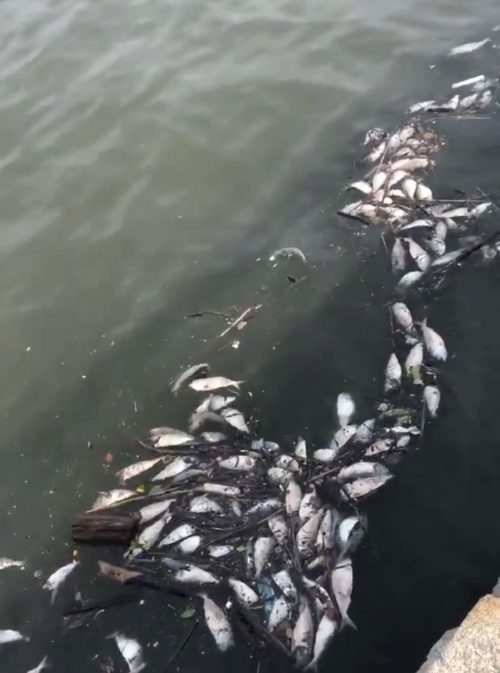Posted on July 9, 2020 at 8:59 pm by Carol Tannenhauser
By Carol Tannenhauser
It was hard to bear: the sight of hundreds, maybe, thousands, of dead fish floating in the Hudson River for the past week, and the smell of them decaying. Commenters to a previous story we posted called it, “horrifying”… “depressing”… “an atrocity!”
”We need to keep the focus on the fish,” George Jackman, PhD, chided, in a phone conversation. “It’s not always about our discomfort.”
Dr. Jackson is Senior Habitat Restoration Manager at Riverkeeper, a nonprofit organization that protects and restores the Hudson. The fish in question are called menhaden or bunker.
“Atlantic menhaden are very sensitive to environmental conditions,” said a spokesperson for the New York State Department of Environmental Conservation (DEC). “For more than a month, there has been little rainfall, very low freshwater input (flushing) into the system and a quick rise in water temperature, resulting in a drop in dissolved oxygen, creating hypoxia (a condition where not enough oxygen makes it to the cells and tissues in the body.) Adding these conditions to the sensitivity of the species, the estuary had become a very stressful environment. The result was death by a lack of sufficient dissolved oxygen. They suffocated. This type of fish die-off incident occurs naturally this time of year when water temperatures warm.”
Hundreds of dead fish floating along the Hudson River this morning pic.twitter.com/li7UvC75GU
— UWSLive (@UWSLive) July 8, 2020
Dr. Jackman called 2020, “an extreme year in terms of the menhaden die-off, which hints at the fragility of an ecosystem, and one that is out of balance. It also forebodes of things to come with climate change. The river is becoming warmer. It is on average 4° warmer in the past 30 years, and the extreme temperatures are higher than ever before. I have seen temperatures north of 83°. That is hot for a fish. In fact, rainbow smelt have been completely extirpated from the Hudson, and tomcod and winter flounder are on their way out.”
As for the question of who will dispose of the dead, the state said it is the city’s responsibility. The city said “talks are going on about the best way to address the situation.” Dr. Jackman said, “I was out on the river the other day and saw fish crows and herring gulls enjoying the bonanza of the menhaden buffet. I am sure raccoons will avail themselves of the free meal, too. Also, the crabs, eels, and other detritivores living in the river will quickly consume the organic matter. That’s nature.”
“The question of smell makes me chuckle a little,” Dr. Jackman concluded. “It reminds me of someone who moves next to a farm and complains about the smell. Nevertheless, if you turn over a menhaden, it can smell putrid.”
If you’re interested in learning more about fish and/or helping the Hudson River, go to the Riverkeeper website here.
"fish" - Google News
July 10, 2020 at 07:59AM
https://ift.tt/3fdTNfq
Hudson River Fish Die-Off Was Exacerbated by Climate Change, Scientist Says - westsiderag.com
"fish" - Google News
https://ift.tt/35JkYuc
https://ift.tt/3feFffJ
Bagikan Berita Ini















0 Response to "Hudson River Fish Die-Off Was Exacerbated by Climate Change, Scientist Says - westsiderag.com"
Post a Comment